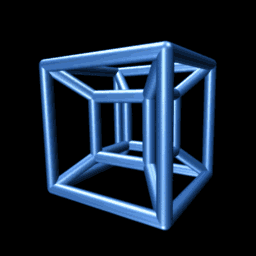BZOJ4531: [Bjoi2014]路径
Description

在一个N个节点的无向图(没有自环、重边)上,每个点都有一个符号,
可能是数字,也可能是加号、减号、乘号、除号、小括号。你要在这个图上数
一数,有多少种走恰好K个节点的方法,使得路过的符号串起来能够得到一
个算数表达式。路径的起点和终点可以任意选择。
所谓算数表达式,就是由运算符连接起来的一系列数字。括号可以插入在
表达式中以表明运算顺序。
注意,你要处理各种情况,比如数字不能有多余的前导0,减号只有前面
没有运算符或数字的时候才可以当成负号,括号可以任意添加(但不能有空括
号),0可以做除数(我们只考虑文法而不考虑语意),加号不能当正号。
例如,下面的是合法的表达式:
-0/0
((0)+(((2*3+4)+(-5)+7))+(-(2*3)*6))
而下面的不是合法的表达式:
001+0
1+2(2)
3+-3
--1
+1
()
Input
第一行三个整数N,M,K,表示点的数量,边的数量和走的节点数。
第二行一个字符串,表示每个点的符号。
接下来M行,每行两个数,表示一条边连的两个点的编号。
1≤N≤20,0≤M≤N×(N-1)/2,0≤K≤30
Output
输出一行一个整数,表示走的方法数。这个数可能比较大,你只需要输出
它模1000000007的余数即可。
Sample Input
6 10 3
)(1*+0
1 2
1 3
1 4
2 3
3 4
2 5
3 5
3 6
4 6
5 6
)(1*+0
1 2
1 3
1 4
2 3
3 4
2 5
3 5
3 6
4 6
5 6
Sample Output
10
//一共有10条路径,构成的表达式依次是101, (1), 1+1, 1+0, 1*1, 1*0, 0+0,
0+1, 0*0, 0*1
//一共有10条路径,构成的表达式依次是101, (1), 1+1, 1+0, 1*1, 1*0, 0+0,
0+1, 0*0, 0*1
就是一道简单的DP辣(好容易写错的呢)。(WA了5发要是考场懵逼了就跪了)
设f[x][k][c][S]表示当前在节点x,已经走了k步,“(”-“)”数量为c,有没有前缀0的路径数量。
转移挺复杂且容易写错的,详见code(也可以用来对拍)。
#include<cstdio>
#include<cctype>
#include<queue>
#include<cstring>
#include<algorithm>
#define rep(i,s,t) for(int i=s;i<=t;i++)
#define dwn(i,s,t) for(int i=s;i>=t;i--)
#define ren for(int i=first[x];i;i=next[i])
using namespace std;
inline int read() {
int x=0,f=1;char c=getchar();
for(;!isdigit(c);c=getchar()) if(c=='-') f=-1;
for(;isdigit(c);c=getchar()) x=x*10+c-'0';
return x*f;
}
typedef long long ll;
const int mod=1000000007;
int f[25][35][35][2];//f[x][t][v] '(' - ')'
int n,k,m,e[25][25];
char s[25];
int iscal(char c) {return c=='+'||c=='-'||c=='*'||c=='/';}
int dp(int x,int t,int c,int pre) {
if(t>=k) return (!c)&&!iscal(s[x]);
int& ans=f[x][t][c][pre];
if(ans>=0) return ans;
ans=0;
rep(i,1,n) if(e[x][i]) {
if(s[i]>='0'&&s[i]<='9') {
if(s[x]>='0'&&s[x]<='9') {
if(!pre) (ans+=dp(i,t+1,c,0))%=mod;
}
else if(iscal(s[x])||s[x]=='(') (ans+=dp(i,t+1,c,s[i]=='0'))%=mod;
}
else if(s[i]=='('||s[i]==')') {
if(s[i]=='('&&(s[x]=='('||iscal(s[x]))) (ans+=dp(i,t+1,c+1,0))%=mod;
else if(s[i]==')'&&c&&(isdigit(s[x])||s[x]==')')) (ans+=dp(i,t+1,c-1,0))%=mod;
}
else {
if(s[x]>='0'&&s[x]<='9') (ans+=dp(i,t+1,c,s[i]=='0'))%=mod;
if(s[x]==')') (ans+=dp(i,t+1,c,0))%=mod;
if(s[x]=='('&&s[i]=='-') (ans+=dp(i,t+1,c,0))%=mod;
}
}
return ans;
}
int main() {
memset(f,-1,sizeof(f));
n=read();m=read();k=read();
scanf("%s",s+1);
rep(i,1,m) {
int x=read(),y=read();
e[x][y]=e[y][x]=1;
}
int ans=0;
rep(i,1,n) {
if(s[i]=='(') (ans+=dp(i,1,1,0))%=mod;
if(s[i]=='-') (ans+=dp(i,1,0,0))%=mod;
if(s[i]>='1'&&s[i]<='9') (ans+=dp(i,1,0,0))%=mod;
if(s[i]=='0') (ans+=dp(i,1,0,1))%=mod;
}
printf("%d\n",ans);
return 0;
}




 浙公网安备 33010602011771号
浙公网安备 33010602011771号